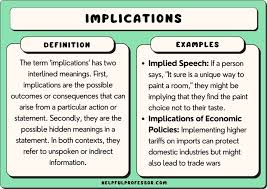The Implications of Technological Advancements
Technology has become an integral part of our daily lives, shaping how we communicate, work, and interact with the world around us. While technological advancements bring about numerous benefits and conveniences, they also come with a host of implications that impact society on various levels.
Social Implications
One of the key social implications of technology is its effect on human interaction. With the rise of social media and digital communication platforms, face-to-face interactions have decreased, leading to concerns about the quality of relationships and social skills. Additionally, issues such as cyberbullying and privacy breaches have emerged as technology continues to evolve.
Economic Implications
From automation replacing manual labor to the gig economy transforming traditional employment structures, technological advancements have significant economic implications. While innovation can create new job opportunities and increase efficiency in industries, it also raises concerns about job displacement and income inequality.
Environmental Implications
The environmental impact of technology is another critical consideration. The production and disposal of electronic devices contribute to electronic waste, while energy-intensive technologies can strain natural resources and contribute to climate change. Sustainable practices and green technologies are essential to mitigate these environmental implications.
Ethical Implications
As technology advances rapidly, ethical considerations become increasingly important. Issues such as data privacy, algorithmic bias, and the ethical use of artificial intelligence raise complex questions that require careful deliberation. Balancing technological progress with ethical principles is crucial for creating a responsible digital society.
Cultural Implications
Technology also influences culture in profound ways. From changing modes of entertainment to shaping cultural norms and values, technological innovations impact how we perceive the world and express ourselves. Preserving cultural heritage in the digital age and promoting inclusivity in digital spaces are important considerations for a diverse society.
In conclusion, while technological advancements offer immense potential for progress and innovation, it is essential to recognize and address the implications they bring forth. By fostering critical dialogue, ethical awareness, and proactive decision-making, we can navigate the complexities of technology to build a more sustainable and inclusive future for all.
8 Essential Tips for Understanding and Managing the Implications of Your Actions
- Consider the potential consequences of your actions before making decisions.
- Be mindful of how your words and behavior may impact others.
- Think about the long-term effects of your choices, not just the immediate results.
- Recognize that your actions can have both positive and negative implications.
- Seek feedback from others to better understand the implications of your actions.
- Stay informed about current events and trends to anticipate potential implications in different situations.
- Take responsibility for the implications of your actions and make amends if necessary.
- Continuously reflect on past experiences to learn from both successful outcomes and mistakes.
Consider the potential consequences of your actions before making decisions.
When faced with decisions, it is crucial to carefully consider the potential consequences of our actions. By taking the time to reflect on the implications of our choices, we can make more informed and responsible decisions. Considering the ripple effects of our actions allows us to anticipate both the positive outcomes and potential challenges that may arise. This thoughtful approach not only helps us avoid unintended consequences but also enables us to align our decisions with our values and long-term goals. Ultimately, being mindful of the implications of our actions empowers us to make choices that have a positive impact on ourselves and those around us.
Be mindful of how your words and behavior may impact others.
It is crucial to be mindful of how your words and behavior may impact others. Every interaction we have, whether in person or online, carries the potential to influence someone else’s feelings, thoughts, and well-being. By practicing empathy and considering the implications of our actions, we can foster positive relationships and create a supportive environment where respect and understanding thrive. Taking the time to reflect on the consequences of our words and behaviors can lead to more meaningful connections and contribute to a culture of kindness and compassion.
Think about the long-term effects of your choices, not just the immediate results.
When considering the implications of our decisions, it is crucial to look beyond the immediate outcomes and consider the long-term effects of our choices. By taking a forward-thinking approach, we can anticipate how our actions today may impact the future, allowing us to make more informed and responsible decisions. Considering the broader consequences of our choices helps us navigate complex situations with greater foresight and mindfulness, ultimately contributing to a more sustainable and positive outcome in the long run.
Recognize that your actions can have both positive and negative implications.
It is crucial to acknowledge that every action we take can have a dual impact, encompassing both positive and negative implications. Whether in personal relationships, professional endeavors, or societal contributions, understanding the potential consequences of our choices is essential. By recognizing the multifaceted nature of our actions, we can strive to maximize positive outcomes while mitigating any adverse effects, fostering a more thoughtful and responsible approach to decision-making in all aspects of life.
Seek feedback from others to better understand the implications of your actions.
Seeking feedback from others is a valuable practice when aiming to comprehend the implications of our actions. By actively engaging with different perspectives and insights, we gain a broader understanding of the potential consequences of our decisions. Feedback provides us with valuable information that we may not have considered on our own, helping us make more informed choices and navigate complex situations with greater clarity. Embracing feedback as a tool for insight allows us to anticipate and address implications effectively, fostering growth and learning in both personal and professional endeavors.
Stay informed about current events and trends to anticipate potential implications in different situations.
Staying informed about current events and trends is crucial for anticipating potential implications in various situations. By keeping up-to-date with the latest developments, individuals can better understand how societal, economic, and technological changes may impact their lives and communities. This proactive approach enables individuals to make informed decisions, adapt to evolving circumstances, and effectively navigate the implications of ongoing changes. Being aware of current events empowers individuals to anticipate challenges, seize opportunities, and contribute positively to shaping the future.
Take responsibility for the implications of your actions and make amends if necessary.
It is crucial to take responsibility for the implications of our actions and be willing to make amends if necessary. Acknowledging the impact of our choices on others and the environment demonstrates integrity and accountability. By reflecting on the consequences of our decisions, we can strive to rectify any harm caused and learn from our mistakes. Taking proactive steps to address negative implications not only fosters personal growth but also contributes to creating a more ethical and compassionate society.
Continuously reflect on past experiences to learn from both successful outcomes and mistakes.
Continuously reflecting on past experiences is a valuable practice that allows individuals to gain insights from both successful outcomes and mistakes. By taking the time to analyze past events, one can identify patterns, understand what worked well, and learn from areas that may have led to less favorable results. This process of reflection not only helps in personal growth and development but also enables individuals to make more informed decisions in the future based on lessons learned. Embracing both successes and failures as learning opportunities contributes to ongoing improvement and enhances one’s ability to navigate challenges effectively.





